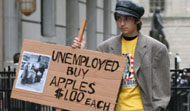
A new story from The Associated Press stopped me in my tracks. The gap in employment rates between America’s highest- and lowest-income families has stretched to its widest levels since officials began tracking the data a decade ago.
Rates of unemployment for the lowest-income families — those earning less than $20,000 — have topped 21 percent, nearly matching the rate for all workers during the Great Depression. U.S. households with income of more than $150,000 a year have an unemployment rate of 3.2 percent, a level traditionally defined as full employment.
At the same time, middle-income workers are increasingly pushed into lower-wage jobs. Many of them in turn are displacing lower-skilled, low-income workers, who become unemployed or are forced to work fewer hours, the analysis shows.
I know things are headed in the wrong direction, but we are looking at economic conditions reminiscent of the Great Depression. It seems incongruous, since Wall Street is prospering with a string of all-time highs.
This is all the more puzzling since President Obama promotes himself as the savior of the lower and middle class. His policies are hurting those he ostensibly is claiming are being helped by his initiatives.
If we take a look at what John Maynard Keynes was advocating in the 1930s to end the Depression, his call for increased government expenditures is what we are doing today. And it isn’t working.
But something he wrote does resonate today:
“We are suffering just now from a bad attack of economic pessimism. It is common to hear people say that the epoch of enormous economic progress which characterized the 19th century is over; that the rapid improvement in the standard of life is now going to slow down; that a decline in prosperity is more likely than an improvement in the decade which lies ahead of us.”
Economic pessimism is the perfect description for this country’s economic morass.
Our entrepreneurs and inventors are sitting on the sidelines, afraid to invest or create because they don’t have faith in the management of the economy.
Can a company hire if they don’t know what their healthcare costs will be under Obamacare? Or worse, must they cut hours of current employees so they aren’t penalized for not offering health insurance to all of their employees? We are already seeing a number of well-known companies taking action to cut employees and hours.
Even Warren Buffet, an ardent supporter of the president in the past, has said that Obamacare must go and the AFL-CIO is in near revolt with many of its union leaders and members openly calling for the repeal of Obamacare.
Can a company embark on new product development if they are afraid that regulations will kill a market? Already, regulations cost our economy $1.2 trillion a year. Although the fossil fuel industry is responsible for nearly two-thirds of our economic growth, it has been relentlessly targeted by Obama regulators, which has had a severe impact on job creation.
And a misappropriated tax structure is enough to make anyone a pessimist. The problem is exasperated by a president consumed by class warfare.
While researching this column, I came across a piece by William Black, writing for The Wall Street Pit, who noted, “The modern sense of the term ‘unemployment’ (willing and able to work, but unable to find a job commensurate with the worker’s skills) was not common until the decades before the Great Depression. The prior assumption was that people were unemployed because they were lazy. There was little understanding of business cycles or inadequate demand, little sympathy for the unemployed, and no sense that business or government were primarily responsible for the level of unemployment.”
If you want to talk about economic pessimism, start by looking at the 26 million Americans who are unemployed or underemployed, including unemployment rates of 12.6 percent for black individuals, 23.7 percent for teens and 9.4 percent for Hispanic workers.
I’m not suggesting that this is the sequel to the Great Depression, but I am suggesting that this country must recover its mojo and start believing in itself again.
I harken to the words of Winston Churchill, who once wrote: “A pessimist sees the difficulty in every opportunity; an optimist sees the opportunity in every difficulty.”
© 2013 Moneynews. All rights reserved.
Urgent: Should Obamacare Be Repealed? Vote Here Now!
SEP



